
































































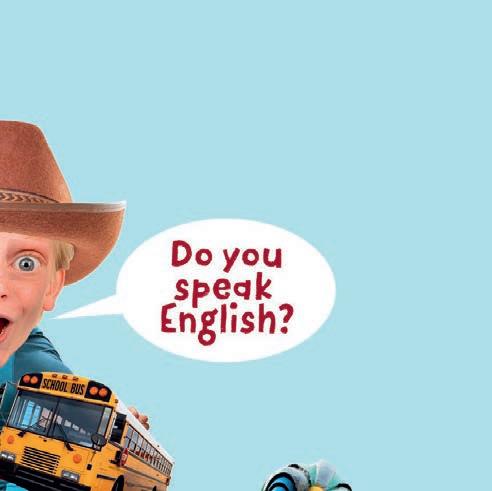











































































































































Synnøve Pettersen
Felicia Røkaas
BOKMÅL Engelsk for ungdomstrinnet














































































































































































































Synnøve Pettersen
Felicia Røkaas
BOKMÅL Engelsk for ungdomstrinnet
This book will take you to the next stage on your journey to improve your English language skills. It will take you to places near and far in the past, present and future. It will even take you to magical faraway places where strange things can happen. On this journey you will be entertained by stories about ordinary and extraordinary people, and fantasy creatures. You will also learn interesting things about the English-speaking world, and meet some of the people who live there. Along the way you will learn and practice your skills in English by listening, reading, speaking and writing. The more you listen, read, speak and write, the better you will be. English opens up new worlds. Explore and be inspired by the people, places and stories in this book. We hope you will work hard and have fun too.
Stages 9 has five chapters. At the beginning of each chapter, you will find the Chapter Focus. These bullet points tell you what the chapter will cover.
Each chapter contains several texts. Each text has a glossary. The words in the glossary are there to help you read the text. You don’t have to learn all the words in the glossary lists. Sometimes you will come across a word you don’t know which is not in the glossary. Don’t panic. You can still understand and enjoy a text even if you don’t know all the words.
You will find these types of tasks in Stages 9:
Starting point: These tasks and activities help prepare you for the text.
Understanding: These tasks check your understanding of the text.
Your teacher will decide how you will do these tasks: orally or in writing.
Viewpoints: These discussion questions often ask you to give your opinion.
Language Lab: These tasks focus on grammar and language.
Vocabulary: These tasks help you learn new words and expressions.
Speaking Spot: These tasks get you talking and help you improve your pronunciation. Listening Skills: These tasks ask you to listen for information.
Writing Workshop: These tasks help you improve your writing skills.
Creative Corner: These activities ask you to be creative, through drawing, role play, making posters, films, etc.
Digital Dive: These tasks send you to the internet to learn more about a topic from the text.
Text Analysis: These tasks help you use specific terms for talking and writing about literature.
Explore More: These tasks suggest ways you can explore something further.
At the end of each chapter, you will find:
SPEAK & WRITE
These tasks are connected to the topic of the chapter. They can be used for tests or for practice.
These grammar courses will help you improve your language skills. Each course presents certain grammar rules with examples. There are also exercises to help you practice the rules.
These writing courses will help you develop the skills you need to improve your writing. Each course gives you explanations, tips, examples and exercises.
Next to some of the tasks in Stages you will see these symbols:
Your teacher will give you a handout.
This task makes you get up from your chair and move around.
This page number tells you where you can find help to complete the task.
The Twits 10
Roald Dahl novel extract
Laughter is the Best Medicine 12jokes
Healthy and Happy 18 factual text
Brain Food 23 recipes
Powerful Emotions 28
Nicola Morgan popular science
The Sweet Tooth 34
James Marshall children’s book extract
Learn the Recovery Position 38factual text
Good Enough 44
Rachel Vail short story
In the Time of Pandemic 52
Kitty O’Meara poem
Speak & Write 55 tasks
Language Work 56 grammar
Improve Your Writing Part 1 61course and tasks
• reading, writing and speaking about health and wellbeing
• using prepositions
• using linking words
• writing five-paragraph texts
So Long, Mom 68
Bill Watterson cartoon CHAPTER FOCUS
Alienography 70
Chris Riddell illustration
Stargazing 72 factual text
To Infinity and Beyond 76 factual text
Back From Mars 81
Kenn Nesbitt poem
May the Force Be With You 84factual text
Fantasy Literature 89 factual text
Dracula 91
Bram Stoker diary entries
Percy Jackson 97
Rick Riordan novel extract
Coraline 106
Neil Gailman graphic novel extract
Speak & Write 112 tasks
Language Work 113 grammar and tasks
Improve Your Writing Part 2 118course and tasks
• reading, writing and speaking about fantasy worlds and the universe
• using adverbs
• analysing literature and using literary terms
Banksy – The Street Artist 126street art CHAPTER FOCUS
The Starfish 130 story
Old Joe and the Carpenter 132folktale
The Smell of Soup and the Sound of Money 136 play
Thomas Edison Interview 141 interview
We Are the World 146
Michael Jackson and Lionel Richie song lyrics
Stop Photoshop 150 campaign text
Killing Trolls With Kindness 158factual text
Speak & Write 162 tasks
Language Work 164 grammar and tasks
Improve Your Writing Part 3 167course and tasks
• reading, writing and speaking about people who have changed the world for the better
• using present and past continuous
• recognising and using formal and informal language
Jamaica 174 factual text
The New World 178 factual text
Ananasi and the Pot of Beans 182folktale
Bob Marley 188 factual text
The United States of America 192factual text
Map of the USA 196 map
A Nation of Immigrants 200 factual text
My City 208 monologues
America 212
Leonard Bernstein and Stephen Sondheim song lyrics
Kissin’ Kate 218
Louis Sachar short story
Canada – the Great White North 228 factual text
Sasquatch 233 article
The Hockey Sweater 238
Roch Carrier short story
Anne of Green Gables 245
Lucy Maud Montgomery novel extract
Speak & Write 250 tasks
Language Work 252 grammar and tasks
Improve Your Writing Part 4 258course and tasks
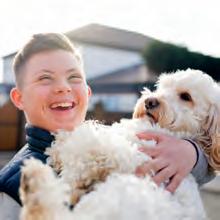
CHAPTER FOCUS
• reading, writing and speaking about the English-speaking world
• using pronouns
• writing creative texts


True Colors 268
Billy Steinberg and Tom Kelly
Marigold 272
Jacqueline Wilson
The Dog of Pompeii 278
Louis Untermeyer
song lyrics CHAPTER FOCUS
novel extract
short story
The Chemistry of Love 286 factual text
Partners in Love and Science 291factual text
William Shakespeare 295 factual text
Romeo and Juliet 298
Based on a play by William Shakespeare graphic story
The Fault in Our Stars 304
John Green novel extract
If You Kiss a Boy 308
Alex Sanchez
The Marriage Proposal 314
Sharon Creech
short story extract
novel extract
Speak & Write 319 tasks
Language Work 320 grammar and tasks
Improve Your Writing Part 5 323course and tasks


• reading, writing and speaking about love and relationships
• using it and there
• using direct and indirect speech
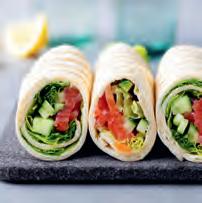


• reading, writing and speaking about health and wellbeing
• using prepositions
• using linking words
• writing five-paragraph texts

Draw two speech bubbles. Write some ugly thoughts in one and good thoughts in the other. Share your thoughts with a partner.
Roald Dahl (1916–1990) was a British writer of books for children. His parents were Norwegian.
If a person has ugly thoughts, it begins to show on the face. And when that person has ugly thoughts every day, every week, every year, the face gets uglier and uglier until it gets so ugly you can hardly bear to look at it.
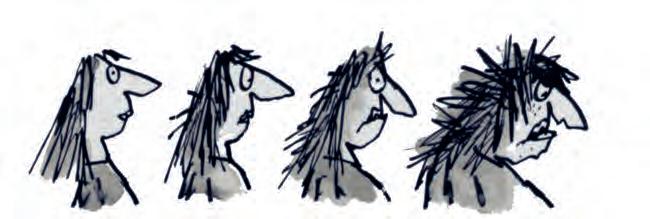
A person who has good thoughts cannot ever be ugly. You can have a wonky nose and a crooked mouth and a double chin and stick-out teeth, but if you have good thoughts they will shine out of your face like sunbeams and you will always look lovely.
twit dust
hardly nesten ikke
bear orke
wonky skjevt
crooked krokete
double chin dobbelthake sunbeams solstråler
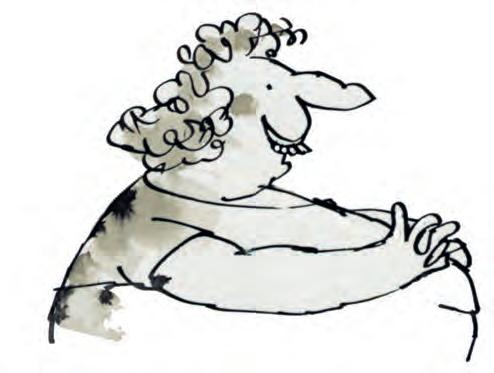
1 Make a voice recording of the text. Use your voice to show your understanding of the text.
2 Discuss the questions.
a Do you think your mindset, the way you think, can affect the way you look? How?
b What makes you smile?
3 Search the internet for quotes on positive thinking. Choose a quote that you like and make a poster. Share your quote with the class.
4 The Twits is a funny book about the smelliest, nastiest, ugliest couple in the world. They are horrible to each other and horrible to everyone else. Read the book yourself or listen to the audiobook.
I’ve never seen a smiling face that was not beautiful.
What makes you laugh?
laughter latter hearty hjertelig releases slipper ut contagious smittsom
Hah! Hah! Hah! Has something got you down? Sometimes a good, hearty laugh is all you need to feel better. Laughter relaxes you and releases endorphins into your body. Those are feel-good hormones. Laughter is also contagious. If you start laughing, others will too. Best of all, laughter is fun, free and easy to use.
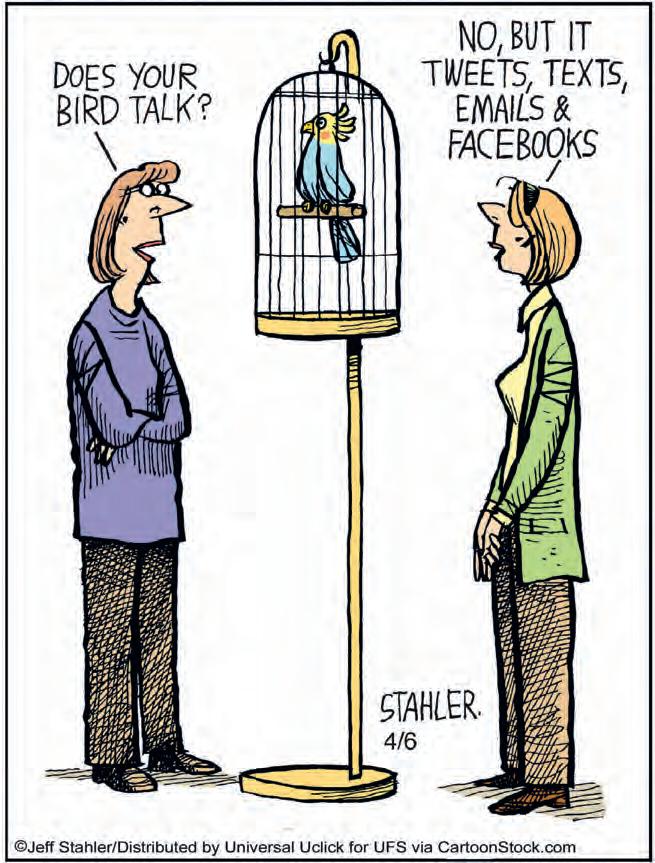
Here are some parrot jokes. Which one do you think is the funniest?
Mrs Stafford’s dishwasher was broken, so she called a repairman. They made an appointment for the next day. Since she would be at work, she told him: “I’ll leave the key under the mat. Fix the dishwasher and leave the bill on the counter. By the way, don’t worry about my dog, Brutus. He won’t bother you. But, whatever you do, do NOT talk to the parrot!”
When the repairman arrived to fix the dishwasher, he discovered the biggest and meanest looking dog he had ever seen. But, just like Mrs Stafford had said, the dog just lay there on the floor, watching the repairman fix the machine. However, the whole time he was there, the parrot drove him nuts with its non-stop squawking. The noise just wouldn’t stop. Finally the repairman couldn’t take it any longer. He exploded “Shut up, you stupid bird!”
When the parrot heard that, it squawked: “GET HIM, BRUTUS!”
Once there was a magician who worked on a cruise ship. He was really good at making things appear and disappear. Every night he had a magic show. The magician was actually quite good, but the ship’s parrot would often mess up his show. It would fly around squawking and giving away his secrets, like:
“IT’S UP HIS SLEEVE, IT’S UP HIS SLEEVE!” or “IT’S IN HIS POCKET, IT’S IN HIS POCKET!” or “IT’S IN HIS MOUTH, IT’S IN HIS MOUTH!”
The magician was getting sick of this. He threatened to sell the parrot if it ruined his performance one more time. That evening right at the end of his show, just as the magician was about to disappear in a puff of smoke, the ship hit an iceberg! It sank in five minutes flat.
Miraculously, there were two survivors, the magician and the parrot! The magician was passed out on a piece of driftwood. When he opened his eyes, he could see the parrot staring at him.
The parrot sat there for hours just staring at him. Finally it said, “OK, I give up, where did you hide the ship?”
parrot papegøye dishwasher oppvaskmaskin
repairman reparatør appointment avtale bill regning drove him nuts irriterte vettet av ham squawking skravlende squawked skrek magician tryllekunstner appear vise seg disappear forsvinne actually faktisk give away avsløre sleeve ermet pocket lomme ruined ødela performance forestilling iceberg isfjell survivors overlevende passed out bevisstløs driftwood drivved staring stirre
fowl mouth stygg i munnen (ordspill på foul mouth) swore bannet sailor sjømann driving him crazy drev ham fra vettet lock låse, stenge cabinet skap clawed klorte let loose slapp løs blush rødme freezer fryseren tremendous voldsom hullabaloo spetakkel wobbled vinglet calmly rolig
Once there was this guy with a parrot. And this parrot swore like a sailor – you’ve never heard such bad language before. That bird could swear for five minutes straight without repeating itself. The trouble was, the guy who owned it did not like swearing at all. The bird’s foul mouth was driving him crazy.
One day, it got to be too much, so the guy grabbed the bird by the throat, shook it really hard, and yelled, “QUIT IT!” But this just made the bird swear more than ever. Then the guy said, “OK, you asked for it!” and he locked the bird in a kitchen cabinet. This really made the bird go wild. It kicked and clawed and squawked and screamed something terrible. When the guy finally let it out, the bird said “You low-down, no good ...” and then let loose a string of swear words that would make a sailor blush.
At that point, the guy was so mad that he threw the bird into the freezer. For the first few seconds there was a tremendous hullabaloo. The bird kicked and clawed and squawked and screamed even worse. The freezer wobbled from side to side. Then suddenly it got very quiet.
At first the guy just waited, but then he started to worry. Maybe the bird was hurt? After a couple of minutes, he was so worried that he opened the freezer door. To his surprise the bird climbed calmly onto his out-stretched arm. Then the parrot said politely, “I apologize for any trouble I might have caused. I shall do my best to behave from now on.”
The man was amazed. What was going on? The parrot pointed back to the freezer and the frozen chicken that lay there. Then it said, “Pardon me for asking, sir, but what did the chicken do?”
1 Choose one of the parrot jokes. Write down keywords and phrases from the joke. Then retell it to a partner using the keywords.
2 Role-play the telephone call where Mrs Stafford makes the appointment with the repairman.
How can I help you?
I need to make an appointment. What is wrong? My dishwasher is broken.
I can come tomorrow morning at 10 o’clock. Thank you very much.
3 How to draw a parrot Work with a partner. You will need paper and coloured pencils. One of you should close your book and draw the parrot, while the other one explains how to do it using the diagram below. The person who is drawing should not look at the diagram!


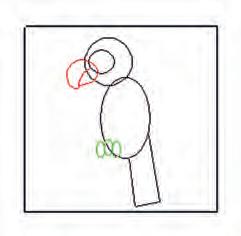


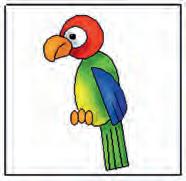
Language prompts first draw ... then make ... head/beak/body/tail/feet circle/oval/rectangle/line at the top of the page at the bottom of the page on the right/left next to/under/over
4 Think about a time when you had a good, long laugh. Write about what happened.
5 Go online and find a joke which you find funny. Write it down. Tell the jokes to each other in small groups. Make a small poster with your joke and a picture and hang it in your classroom.
The punchline is the last part of the joke that makes it funny.
6 Find and watch a funny video clip on the internet. What makes it funny? Write down your thoughts.
7 Vocabulary
Which is the odd one out?
a parrot dog chicken turkey
b carrot banana grape apple
c freezer refrigerator bathtub dishwasher
d scream kick yell squawk
e return come arrive leave
f get him be quiet shut up pipe down
g sunset night evening sunrise
h laughter worry joke smile
i pleased bothered angry annoyed
The odd one out means the one that is different from the others.
8 Phrasal verbs
Find the missing preposition in the phrasal verbs from the parrot jokes.
a Shut up, you stupid bird.
b He was really good ___ making things appear.
c The parrot would mess ___ his show.
d It would give ___ his secrets.
e The magician was getting sick ___ this.
f The magician was passed ___.
g I give ___.
h You asked ___ it!
i What was going ___?
9 Which phrasal verb above means ...
a deserve ask for
b tell
c happen d unconscious e ruin
10 Spelling
a Find the missing vowels in these words from the jokes.
1 magic _ _ n
2 disapp _ _ r
3 furi _ _ s
4 rep _ _ rman
5 app _ _ ntment
6 m _ _ nest
7 sw _ _ r
8 s _ _ lor
9 fr _ _ zer
10 scr _ _ m
b Use each word in a sentence.
c Translate the words to Norwegian.
Can you translate them into any other languages? A phrasal verb is a combination of a verb + a preposition that creates meaning. Carry on!
Choose three words from the word cloud that give you positive energy. Explain to a partner why you chose them.
school
friendship
success family religion playing grades music snow laughter sunshine competition
roller coaster berg- og dalbane expectations forventninger hurdle hinderløp siblings søsken perform well gjøre det bra diseases sykdommer influence påvirke
Being a teenager can feel like riding on a roller coaster. Sometimes we feel bombarded with expectations and frustrations – everything seems like an impossible hurdle. Other times we are filled with joy and excitement – the sky is the limit! Life has its ups and downs. This is perfectly normal. Not even the celebrities and sports stars in the glossy magazines are happy all the time. Beauty, fame and money are not what make people happy. Happiness usually comes down to a few simple things: good health and good relationships with friends and family. Let’s take a closer look at some keys to a long and happy life.
One key to a good life is being active. Regular physical activity reduces the risk of stress and many diseases, and generally makes us feel better and happier. It may even influence how well we do at school. A lot of teenagers love sports and like to be active. However, too many young people
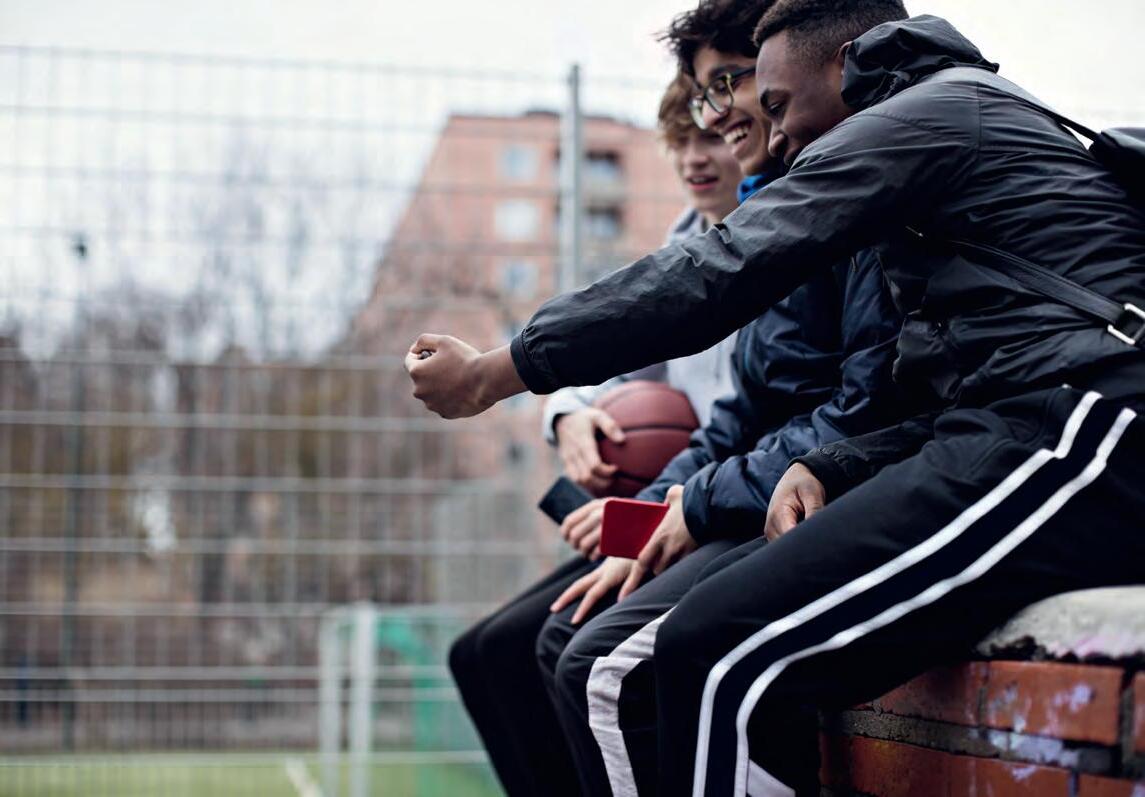
drop out of organised sports. They either lose interest or cannot find time between school, friends, part-time jobs and chores. However, keeping active can help us cope with many of the challenges we face in our lives. Even a little exercise is better than none. Small things such as going for a walk with a friend or biking to school can make a difference. Most of us can make the choice to be more active.
Eating well is another key to a good life. Healthy food is important for everyone, but especially for teenagers. During puberty, the body needs lots of energy and nutrients to grow. Sometimes, a busy schedule makes us depend on junk foods full of salt, sugar and fat. These foods don’t have enough vitamins and minerals. Researchers agree that we should eat at least five servings of fruits and vegetables every day. It is ok to eat sweets and salty snacks now and then, as long as our everyday diet is varied and healthy.
chores plikter cope takle challenges utfordringer nutrients næringsstoffer prevent forhindre schedule timeplan researchers forskere servings porsjoner
The best six doctors anywhere and no one can deny it are sunshine, water, rest, and air exercise and diet.
Nursery rhyme
Feeling well also depends on how much emotional stress there is in our lives. Having good relations and fun with the people close to us is important for our emotional wellbeing. In fact, being a good friend and caring about others adds meaning to our lives. Feeling useful to others builds selfesteem. Moreover, doing things that we think are fun together with others reduces stress and improves our quality of life. Do you remember the last time you made someone feel good or had a really good laugh? If you are too busy to laugh, you are too busy!
There are many ways to a healthy and happy life. Firstly, we should accept that life has its ups and downs. No one feels happy and on top of things all the time. Accept that you sometimes feel down. If it lasts longer than you think is ok, talk to someone about it, for example your school nurse. He or she is there to keep you safe and healthy. Secondly, we should take care of our physical health. Exercise and healthy food make our bodies strong and help us cope with worries and stress. Moreover, we should try to nurture good relationships with our friends and family. Finally, don’t forget to have fun!
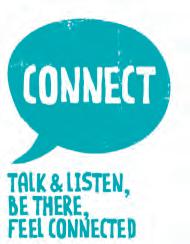
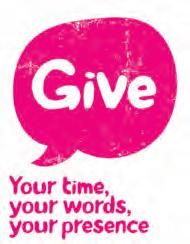
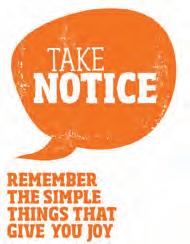
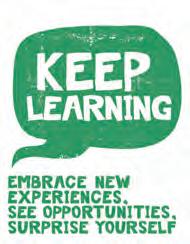
Introduce these five simple strategies into youR life and you will feel the benefits.
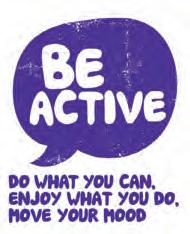
1 Answer the questions.
a List some keys to a healthy life.
b What kinds of expectations do teenagers face?
c Why is exercise important?
d Why is it important for teenagers to eat healthy foods?
e Why is having fun with others good for you?
2 Discuss the questions.
a “Beauty, fame and money do not make people happy.” Do you agree? Why or why not?
b What makes you happy? List 3–4 things.
c How can we create a class environment where everybody feels comfortable and happy?
d Why do you think many teenagers drop out of organised sports?
e What advice would you give a friend who is going through a hard time?
3 What advice would you give the teens below? Here are some phrases to help you get started:
You should ... You ought to ... You could ... Why don’t you ... It might be a good idea to ... If I were you, I would ...
Charlotte practises tennis every day after school and spends 2–3 hours doing homework every night. She has little time for friends or other activities. Now she is starting to lose her motivation for both school and tennis.
Oliver drinks three cans of his favourite energy drink every day. He is worried because sometimes he feels anxious and his heart starts beating fast and hard.
Chris often feels hungry on the way from school to football practice, and pops into the store to buy a chocolate bar nearly every day.
Sarah never eats breakfast. She is not hungry in the morning, but by 10 o’clock she feels hungry and tired. It is hard to wait another hour and a half for lunch.
Adil is a gamer. He quit football practice to have more time for gaming. He often stays up late and some nights he only gets 4–5 hours sleep. Quite often he is late for school because has a hard time getting out of bed in the morning.
Kendra and her younger brother argue all the time. This makes Kendra sad and her parents annoyed. Some days she wishes she did not have to go home.
4 Vote with your feet.
Your teacher will read these statements about being happy and healthy. Move to one side of the classroom if you agree. Move to the other if you disagree.
I got a good night’s sleep last night. Dancing makes me feel good.
I get regular exercise.
I sing when I am happy.
I eat fruits and vegetables every day.
My life is stressful.
Our teachers give us too much homework. Gaming is a good way to relax.
I often bring my phone to bed.
I bring a water bottle to school.
I spend too much time on social media.
I do an organised activity.
I listen to music when I feel low.
I ate breakfast this morning.
5 Use four photos to tell your story. Find a photo of:
• yourself
• an object or person that is important to you
• your hobby or interest
• something that shows your personality
Create a digital or paper collage with the photos. Present your collage to your classmates and tell why you chose these photos.
Did you know that some types of food are good for your brain? Draw an outline of a brain and write BRAIN FOOD in the middle. What foods do you think boost your brain power? Discuss with a partner.
Healthy foods are good for your body and good for your brain. Just like your heart, lungs and muscles, your brain needs nutrients too. Did you know that certain foods can boost your brainpower? They help you remember more, think better and stay focused. Some of these brain foods are: nuts, berries, beans, avocadoes, dark greens, whole grains and fish. Here are two easy recipes filled with tasty nutrients for the brain. Pack some brainpower into your next lunch!
Brain Boost Smoothies
Serves 4
Time: 10 minutes
Ingredients
1 banana
3 dl apple juice
1 dl cottage cheese
½ dl quick oats
1 dl walnuts
2 ½ dl frozen blueberries
2 ½ dl frozen raspberries
Combine the banana and apple juice in a blender. Then add the other ingredients. Blend until smooth.

healthy foods sunne matvarer nutrients næringsstoffer boost øke dark greens mørke bladgrønnsaker whole grains helkorn tasty smakfulle quick oats lettkokte havregryn blend bland
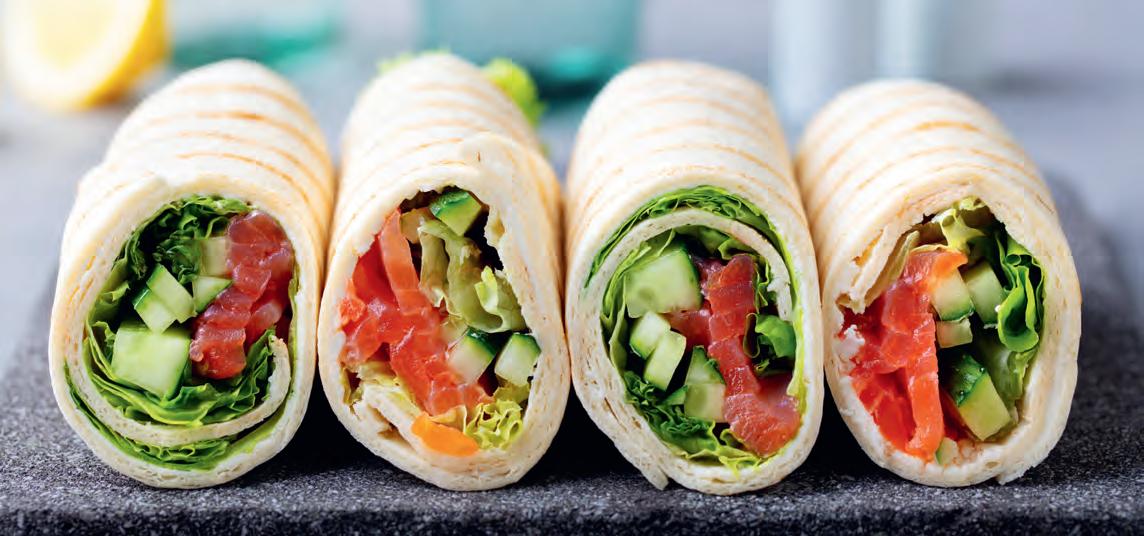
smoked salmon røkelaks cucumber slices agurkskiver scrambled eggs eggerøre frying pan stekepanne spatula stekespade aside til side
cheese cutter ostehøvel paper towel papirhåndkle layer lag sprinkle dryss rocket ruccolasalat
Serves 4
Time: 20 minutes
Ingredients
4 eggs scrambled
1 tablespoon butter
4 whole wheat flour tortillas
12 slices smoked salmon cream cheese
36 cucumber slices rocket
First make the scrambled eggs. Break the eggs and mix them together in a bowl. Melt the butter in a small frying pan on medium heat, and then pour in the eggs. Move the eggs around in the pan with a spatula. When the eggs are ready, set them aside to cool.
Prepare the cucumber slices next. Use a cheese cutter to slice the cucumber into thin slices. Then put them on a paper towel to dry.
Now start putting together the wraps. First spread a thin layer of cream cheese on the tortillas. Then arrange three slices of smoked salmon on each. After that, put three slices of cucumber on each piece of salmon. Next put a thin layer of scrambled eggs on top. Last, sprinkle a small handful of rocket over everything. Roll up the wraps. Cut the wraps in half before serving.
1 Answer the questions.
a What does your brain need?
b What do brain foods do?
c What are some brain foods? Add them to the brain that you drew in the Starting point.
d What kinds of berries are used in the smoothie recipe?
e What kind of salmon is used in the wrap recipe?
f What do you need to make before you put together the wraps?
g What is the last thing you do before serving the wraps?
h Which recipe takes the least time to make?
2 Discuss the questions.
a Which brain foods do you eat regularly?
b What are your favourite kinds of nuts?
c Have you made smoothies or wraps before? Which ingredients did you use?
d Which brain foods would you like to add to your lunch box?
3 Sequence words
Trace your hand into your notebook and then copy the words on the fingers below. These sequence words will help you to structure your text in task 4.
4 Writing recipes
Smoothies and wraps can be made with many different ingredients. Create your own healthy recipes for smoothies and wraps. Use sequence words when you write the recipe. Share your recipes with your classmates.
5 Sickening Smoothies and Rotten Wraps. Create a recipe for the most unhealthy smoothies and wraps you can think of!
6 In small groups, explain how to make something you know how to cook. Use sequence words in your explanation.
7 Sequence words
Find the missing sequence words from the recipe.
___ spread a thin layer of cream cheese on the tortillas. ___ arrange three slices of smoked salmon on each. ___ put three slices of cucumber on each piece of salmon. ___ put a thin layer of scrambled eggs on top. ___, sprinkle a small handful of rocket over everything.
8 Food idioms
If something is a piece of cake it means it is very easy. Find the missing word in each food idiom from the list below.
cucumber cake
peanuts sardines
potato noodle
bananas tea
nuts beans
peas apple
Eating healthy is a piece of cake!
a That is so easy! It is a piece of cake.
b He is a bad ___; you should stay away from him.
c Mom will go ___ when she see the mess we’ve made.
d The twins are like two ___ in a pod.
e He bought the computer for almost nothing; it cost him ___.
f He is always on the sofa watching TV. What a couch ___!
g They packed us into the subway like ___; we could hardly move.
h She looks cool as a ___ in this heat.
i Opera is not my cup of ___, so I’ll stay home.
j Please do not spill the ___ about the surprise party.
k What you are saying is crazy! Have you gone ___?
l Use your ___ to figure out the problem.
9 Work with a partner. Write all the food idioms from task 8 on cards or pieces of paper. Place the cards upside down. One of you picks up a card and mimes the idiom. The other one tries to guess which idiom it is. Take turns miming the food idioms until you have used all the cards.
10 British and American English
These are foods with different names in British and American English. Match the British and American words.
British


Work with a partner. Role-play a typical argument between a parent and teen.
Nicola Morgan (1961–) is a British writer. She wrote the book Blame My Brain to explain how the teenage brain works.
“I hate you – oh, and by the way, can I have some money?”
You don’t have to understand all the words in a story to enjoy it.
Meet Matt. And his mum. There is an emotional war going on. And neither of them knows why.
Matt’s parents are worried about him. He used to be a model pupil but recently his grades have slipped. He is moody, spends a lot of time in his room, and listens to dreadful music with lyrics which are negative, depressed and frankly weird. He has posters of Kurt Cobain around his room and when his mum asked politely why he liked Kurt Cobain his answer was: “Because, like, he killed himself and that is just SO neat.”
“Unlike your room,” she joked, trying not to react.
argument krangel recently i det siste slipped falt moody humørsyk dreadful fryktelig lyrics tekster neat kult react reagere going on maser odd rart glare blikk employers arbeidsgivere failure taper breaking point bristepunkt chat prat
“God, Mum, you’re always going on. Just leave me alone!” he shouted, giving her an odd manic glare. Was he on drugs? she wondered.
Anyway, yes, so they are worried about him. They only want him to be happy. And safe. And nice to them. And successful. And an A-grade student. And get a brilliant job. And score more goals than anyone else in the inter-schools football tournament when everyone is watching. Yes, they are worried about Matt. But it’s only because they care. It’s a tough world out there and how will he get on if he shouts at his parents? Will he shout at his employers too? Will he be a complete failure? It’s enough to drive a mother to breaking point herself.
So, this evening, Matt’s mum has decided to have a little chat. Just a relaxing chat about nothing in particular. A
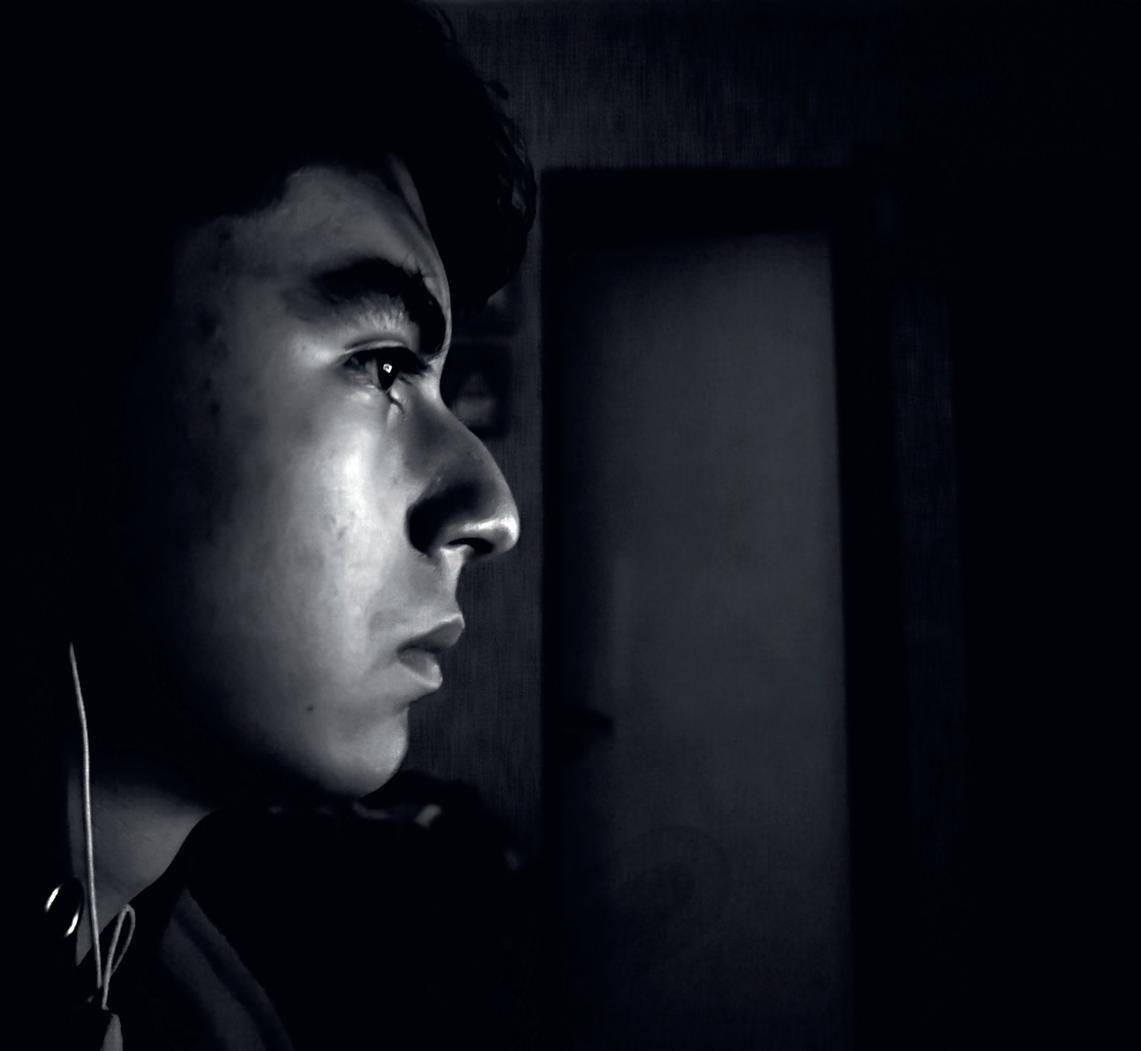
chance to do some mother-son bonding. She’s going to go into his room and ask how his day was. No pressure. She knocks on the door. No reply. Again, louder. No reply. So she turns the handle, at the same time calling his name. The room is quite dark. There’s a smell of incense. But she will ignore that. It’s quite a nice smell, actually. Soothing. Though no amount of dry-cleaning will ever get it out of the curtains. And she made those curtains herself, sewed till her
bonding tid sammen pressure press handle dørhåndtak incense røkelse soothing beroligende dry-cleaning rens curtains gardiner

gloom halvmørke downfall undergang entirely helt crammed proppful doodles kruseduller hangman bøddelen nooses løkker entwined omslynget accidentally tilfeldigvis exaggerated overdrevet effort innsats hauls himself heiser seg butt out ikke bry deg pile haug
fingers bled, to make the house look beautiful, and what does Matt care? She pushes aside the shiver of teethgrinding irritation.
“Matt,” she calls. He is lying on his bed, eyes closed, headphones wrapped around his head, drumming the beat on his mattress. His homework is lying open on the desk. Peering through the gloom, she reads the title: “To what extent was Macbeth’s downfall within his control?” He has written two lines so far: “In the play Macbeth by William Shakespeare, Macbeth has a very tragic downfall. It was entirely the witches’ fault because they shouldn’t of ever said what they said.” Crammed into the margin are detailed doodles and when she looks closely she sees they are dozens of hangman’s nooses all entwined together.
She moves the burning incense to a safer place and accidentally kicks over a can of Coke on the floor. Matt opens his eyes.
“Mum! What the hell are you doing? This is my room! Get out! OK?”
“Yes, sorry, Matt. I did knock.”
“Yeah, well, knock louder next time.”
“I just thought I’d come and ask how your day was. Can I get you anything? I could bring you some tea or something. It’s quite a good idea to drink tea while you’re doing your homework. Relaxing and stimulating at the same time.”
“Yeah, well, I’m not doing homework, am I?”
“Don’t you think you should finish this essay?” she says, pointing at the almost empty page.
Matt rips his headphones off and with exaggerated effort hauls himself to his feet. He is six inches taller than his mum and looking down on her is a great feeling. “Look, butt out, Mum. It doesn’t need to be done for ages.”
“When?”
“Like, days. I don’t know, Friday or something.”
“Don’t you even know?”
“Yes, it’s written down. It’s under control. I’m not stupid, you know.”
“Well, OK, but how about doing some other homework then? There must be something that needs to be done for tomorrow. It’s a good idea to try to be ahead of things, Matt. Don’t you get weekly French tests? I could test you or something. It’s so much easier to learn when someone tests you.” She picks up a book from a pile on the floor.
You can almost see the electricity fizzing through Matt’s body. You can see the anger in his clenched muscles and his thunderous face.
“Put it down, Mum. Leave me alone! I’ll do it by myself. You don’t know any French anyway.”
“Well, if you will do it on your own, fine, Matt. But will you? That’s what I want to know!”
“Oh, right, so you don’t trust me now?”
“Well, I want to trust you. But how can I trust you after last week, when I found that message in your notebook from Mrs Legless saying you hadn’t done your homework?”
“That was just once!”
“And the week before? Mr Golightly?”
“That was because you made me do the ****** housework!”
“No, Matt. You have your chores to do at the weekend and you know the deal is that if you don’t do them then, you have to do them during the week.”
“It’s unfair. No one else has to do chores. Why does the house have to be so bloody tidy anyway? What are you? A cleaning obsessive? Even my friends think this house is weird cos it’s so clean. There’s medical treatment for people like you – I was reading about it the other day. There’s even a name for it. It’s a mental disorder. You should see a doctor.”
“That’s enough, Matt!” shouts his mother. “Don’t speak to me like that!”
A voice shouts irritably from downstairs. Matt’s dad. “What’s going on, you two? Keep the noise down, for goodness’ sake! I can’t hear myself think.”
Matt looks at his mum triumphantly. She fumes, betrayed, furious. And it had all started with her offering to help.
She picks up some dirty socks and leaves the room.
Matt slams the door.
“Don’t slam the door!” she shouts.
“Get out of my life!” he yells back.
Five minutes later he comes downstairs.
“There’s a party at someone’s house on Saturday. Not sure where. I need new jeans. Can I have some money?”
This is an extract from the book Blame My Brain.
clenched knyttede trust ha tillit til chores plikter unfair urettferdig obsessive besatt treatment behandling disorder lidelse fumes er sint betrayed sviktet
1 Answer the questions.
a Why are Matt’s parents worried?
b What do they want for Matt?
c Why does his mum go into his room this evening?
d What is Matt doing when she comes in?
e Why does Matt need money?
2 Discuss the questions.
a Why do you think Matt’s grades have dropped?
b What goes wrong when Matt’s mother comes to his room?
c How can Matt and his mother improve their communication?
d What do you think happens next? Do you think Matt’s parents should give him the money?
e Do you ever argue with your parents? What do you argue about? How do the arguments usually end?
3 Finish these sentences about yourself.
a If I am told to clean my room, I ...
b If I get a bad grade on a test, I ...
c If I argue with my parents, and I know deep down that I am wrong, I ...
d If I were my mother/father, I would ...
4 Matt writes a message to a friend about the situation with his mother. Write this message.
5 Role-play the scene in Matt’s room.
6 Role-play what happens when Matt comes downstairs and asks for money.
7 Prepositions
Find the correct prepositions in these sentences from the text.
about out to into off under on at
a It is under control.
b His parents are worried ___ him.
c There is a party ___ someone’s house on Saturday.
d She is going to go ___ his room.
e She knocks ___ the door.
f Matt rips his headphones ___.
g He hauls himself ___ his feet.
h Get ___ of my life!
8 Prepositions
Work with a partner. Take turns making sentences about yourselves with these prepositions of time: at in on since for until by after ago
I will be 14 by the end of the month.
Stages 8–10 er Aschehougs læremiddel i engelsk på ungdomstrinnet.
Stages legger særlig vekt på:
• Et aktiviserende klasserom der samarbeidslæring og kommunikasjon står i fokus.
• Systematiskspråkopplæring. Du finnegrammatikkog språksider etter hvert kapittel.
• Systematiskskriveopplæring. Du finneskrivekurs etter hvert kapittel.
•God lydstøtte innlest av profesjonelle skuespillere.
• Spennende tekster og illustrasjoner som stimulerer til lærelyst.
• Oppgaver hvor elevene må bevege seg i klasserommet og leke med engelsk.

Stages 9 består av:
• Stages 9 lærebok
• Stages 8–10 Aschehoug Univers
•Lærerveiledning på Aunivers.no
•Digitalbok
DetdigitaleinnholdetfinnedupåAunivers.no